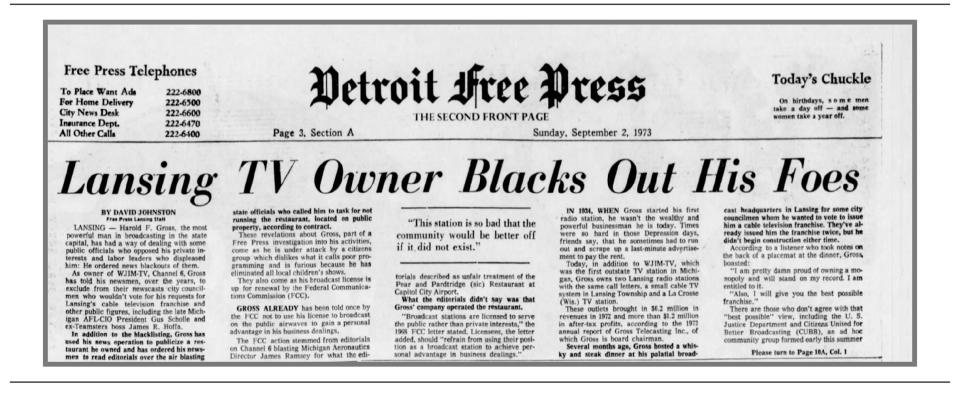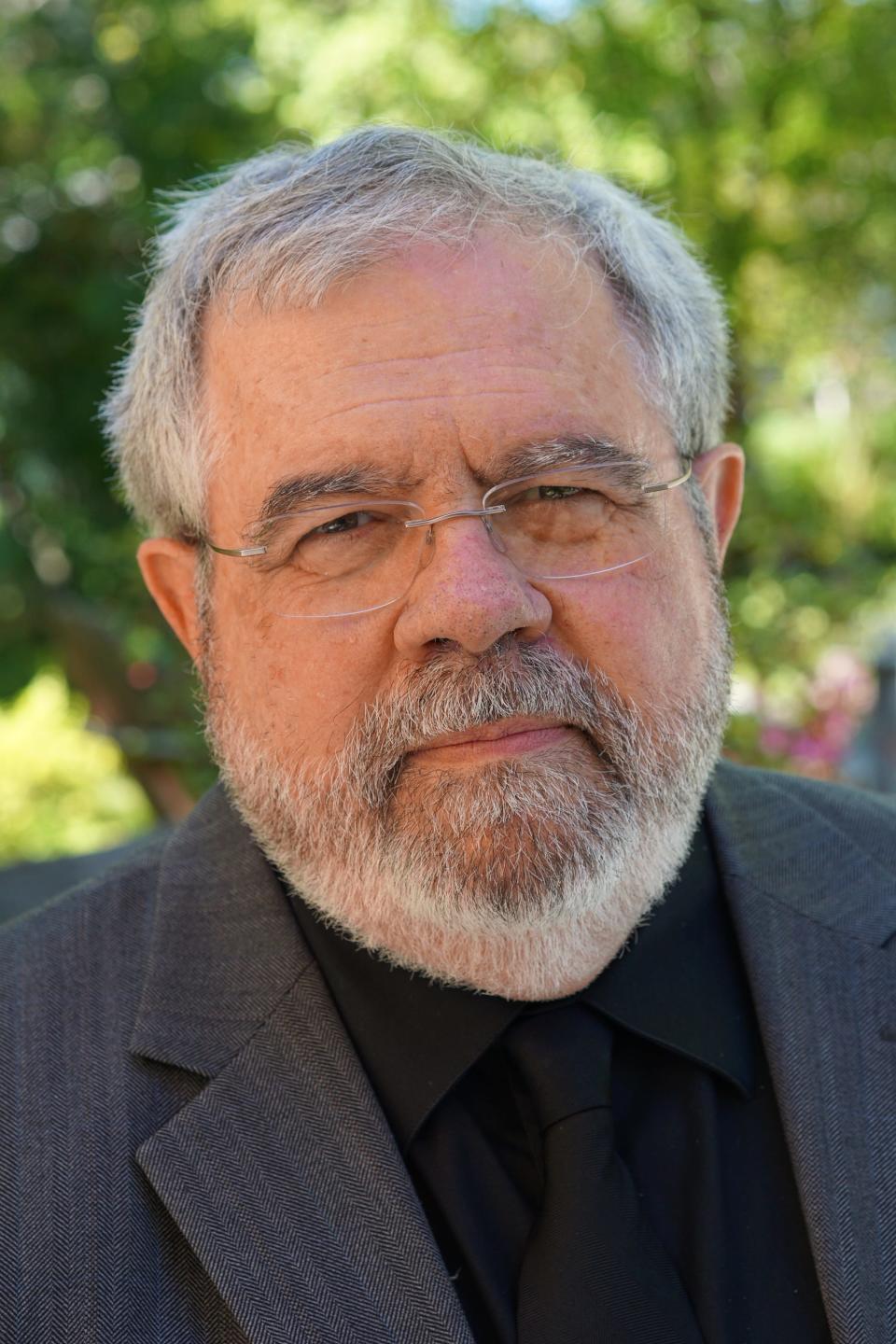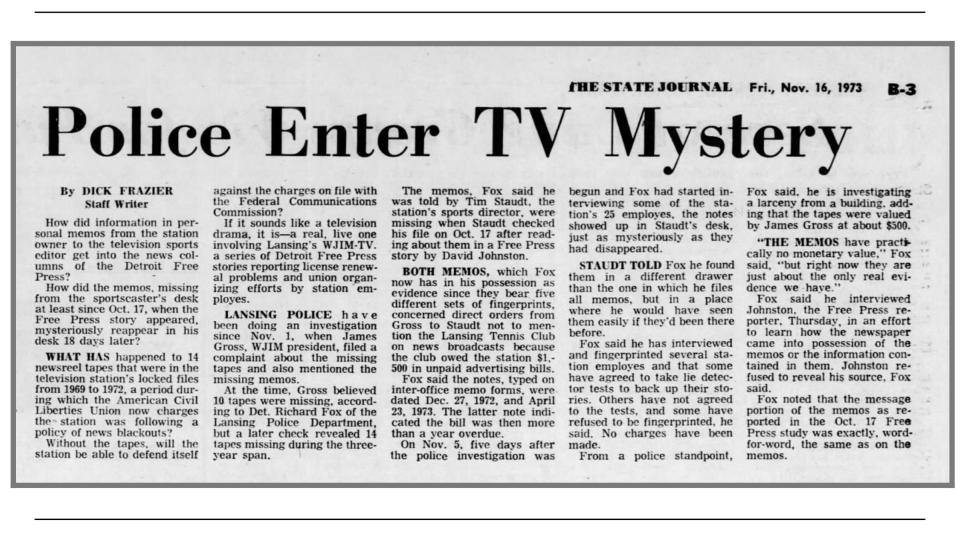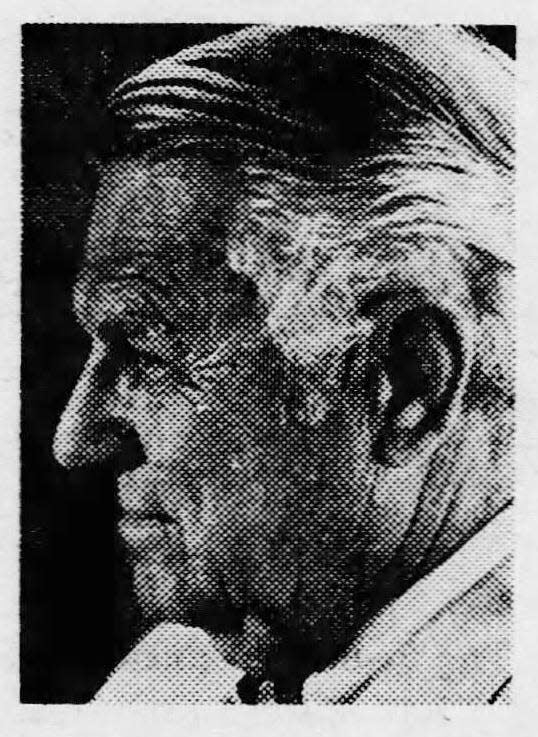I broke the story of Michigan TV station’s sins. And it shook the industry | Opinion
These days, news coverage about the news itself is commonplace. CNN and FOX carry weekly programs about the media. The New York Times employs a team of journalists to cover the news business, and other publications specialize in covering journalism.
But in 1973, for the media to scrutinize itself was almost unheard of. That changed on Sept. 2, 1973, when the Detroit Free Press broke the story of news manipulations and coverage blackouts at the phenomenally profitable WJIM-TV Channel 6, the only television station in the state capital.
"Lansing TV Owner Blacks Out His Foes" read the Free Press' Sunday banner headline — the first of many stories about the calculated dishonesty of WJIM owner Harold F. Gross. More than a decade later, this coverage prompted a unique event in American broadcast history: Gross Telecasting Inc. shut down, selling WJIM, a CBS affiliate, and five other stations at fire sale prices to new owners with a new call sign, WLNS.

I was the reporter who broke that story. The corrupt reporting that continued for years at WJIM, and the changing conventions defining news, carry important lessons for America today, where surveys show that trust in news organizations is at an all-time low, and many Americans dismiss reports they dislike as "fake news," a phrase popularized by Donald Trump, the former president.
At the same time, studies and lawsuits have documented how some cable and online news sources — operating beyond regulatory oversight — manufacture facts or twist them to fit their owners' agendas. In April, Fox News paid Dominion Voting Systems an eye-popping $787.5 million to settle a lawsuit over lies it reported as facts.
Many Americans, surveys suggest, conflate all news outlets, instead of distinguishing between those that lie for profit, and those that do their best to tell the truth.

Blackouts and manipulations
In July 1973, I learned that the American Civil Liberties Union Lansing chapter planned to challenge WJIM's broadcast license renewal, partly because it had stopped carrying children's programs. Sources told me the Lansing State Journal had killed a story about the ACLU challenge at the behest of station owner Hal Gross.
I thought that was interesting enough to merit one paragraph in Tipoff, a Free Press column for short news items. The following day, I stopped by WJIM for what I thought would be a perfunctory interview, only to be locked inside a richly paneled conference room for nearly an hour. Suddenly, the door opened, and an employee escorted me into Gross' opulent office, where he instructed me in no uncertain language that I was forbidden to write about his station. Thanks to Gross' reaction, I knew I was onto a bigger story — though not what he was hiding.
More from opinion: I spent 22 years as AFT union leader. Here's what the future of labor must be.
Line 5 rupture would devastate Great Lakes. Should Enbridge pipeline move because of the risk?
So I headed for the Capitol, and Tom Greene, a respected Detroit television journalist with a distinctive walrus mustache, reported for WJBK Channel 2. Greene regaled me with stories about Gross ordering news blackouts and declaring that Lansing Mayor Jerry Graves would never appear on WJIM news, except with his fly unzipped.
Greene (who died in 2012) helped me find former WJIM journalists, five former news directors and four other WJIM journalists, who described instructions from Gross to keep various politicians out of the news, or only show them in a negative light, particularly when Gross wanted the Lansing City Council to give him a monopoly cable television franchise.
Councilman Harold Moore resisted. One WJIM news director told Moore to vote for the Gross cable monopoly, or else the station’s news programs "will tear you down [until] you won't be able to walk down the street and look anyone in the eye. We're that strong. We're more powerful than anybody else in the community." The news director and a cameraman confirmed what Moore said.
Some former WJIM staffers who had kept the memos from Gross ordering blackouts and news manipulations shared them with me.
Gross told Lansing police that I must have burglarized his station to get the blackout memos — a story the Lansing State Journal did run.
After weeks of phone calls, I had found only one former WJIM journalist who said he had no recollection of orders to manipulate the news. At the time, he ran a state trade association that might be the subject of WJIM news coverage.

Underfunding the news
A few years earlier, the Federal Communications Commission had chastised Gross for devoting most of a nightly newscast to berating a state civil servant who wouldn't give Gross the lease terms he wanted for a restaurant at the Lansing Airport. The FCC reminded Gross that his license to broadcast over the publicly owned airwaves was not for his personal benefit, but only to serve "the public interest, convenience, and necessity." The lesson hadn't sunk in.
Gross was incredibly cheap. To reduce salary costs, the 11 p.m. weather report was often recorded hours earlier to reduce salary costs, a potentially lethal policy. Staffers told me of raiding gas station bathrooms for toilet paper, because Gross refused to buy enough. Several tiny Upper Peninsula TV stations said they had bigger film budgets than WJIM. When an antiquated news camera failed, Gross kept the new one on his desk for days, haranguing his news staff about its cost. A cameraman told me that when Queen Elizabeth II visited, he carefully saved the station's last 100 feet of news film in case her departing plane crashed.
More from opinion: Rep. Maddock's comments about a civil war aren't just irresponsible – they're dangerous
Every few years, broadcasters must renew their FCC licenses. Most renewals are routine, but broadcasters are required to survey community leaders to identify issues deserving of news coverage. Even though more than 26,000 United Auto Workers members lived in the station's market, none were interviewed. Instead, Gross relied on a Michigan State University trustee who lived 100 miles away, well beyond the station's signal, to speak for labor.
A UAW leader, James Ramsey, told the station in 1971 that it should cover labor issues. Two years later he said, "They haven't done anything."
Gross told his staffers that news programs should show only children playing amid flowers. He said he was planning a replacement for the children's programs he had killed — home movies shot by a retired Oldsmobile worker that would have been dirt cheap.
The first Free Press story I wrote quoted John Abel, a professor of broadcasting at Michigan State University and a leader in the move to restore WJIM children's programming: "The station is so bad that the community would be better off if it did not exist."
A calculated fraud
To my astonishment, all of this was common knowledge among Lansing journalists. But none of the journalists I interviewed had ever thought that there was a story in this. Back then, editors didn't consider the news media a news story. But I was self-taught. I had become a San Jose Mercury staff writer while still a teenager, and solved my first murder case at 21. I paid no heed to news conventions, which pleased most of my Free Press editors.
Soon, Gross faced a formal license challenge. Harvey Shulman, who had graduated from the University of Michigan law school the year before, had read my Free Press stories, and agreed to take up the license challenge through the Media Access Project, a tiny public-interest law firm in Washington D.C.

Shulman, just 24, had never been in a courtroom. But he organized a team of law students who relied on meals cooked by supporters as they dug into obscure records. Despite being terrified by his driving, the team crisscrossed the Midwest in Shulman's Dodge Dart, gathering affidavits from former WJIM news staffers.
Shulman’s team discovered a calculated fraud. Gross replaced CBS network ads with local commercials, while collecting money for both, an illegal practice known as "clipping." A fake CBS Eye logo allowed Gross to cut away from network programs early, or join them late, with viewers being none the wiser. That created time for more local ads in place of network commercials. A sampling of billing records uncovered 621 instances of this over 44 months, starting in late 1970.
That long-running fraud helped explain why Forbes magazine described Gross Telecasting as America's second-most-profitable broadcaster. FCC records showed that in some years, the television station counted 50 cents on each dollar of revenue as profit, about triple what was typical. Profit margins at the station's sister AM radio station ran as high as 90%, FCC records showed.
'Where's the justice?'
Arrayed against Shulman's team were superb lawyers. Gross hired Leo Farhat, reputed to be the best litigator in Michigan, and ArentFox, the go-to Washington law firm for broadcasters facing trouble with the Federal Communications Commission.
The effect of my continued articles and Shulman's diligence became clear when Gross, who stood six-foot-four in his bespoke suits and projected an image of being courtly — or imperious, depending on your point of view — had to submit to questioning under oath.
Gross looked down at Shulman, a skinny guy with a mop of wiry hair who barely came up to his neck, and put his hand out to shake. "Oh, I pictured you to be somebody totally different — bigger, much older," Gross said, inadvertently revealing that Farhat had prepared him to face a formidable adversary.
Finally, in 1983, a decade after the Free Press broke the story, an FCC administrative law judge issued a devastating 247-page report that supported everything the Free Press had reported and more. The FCC offered Gross a "short license" renewal, an implicit message that Gross should cash out of the business, or lose everything.
Gross also had to pay the ACLU Lansing chapter $800,000 ($2.4 million in today's dollars), creating a permanent endowment to finance the defense of constitutional rights in the state capital area.
Gross took the hint, selling in January 1984. I returned to Lansing to write about the case for the Free Press and my then-employer, the Los Angeles Times.
Lansing Mayor Gerry Graves, whose UAW allegiances had drawn Gross's ire, told me he was glad Gross was out. But, he added, "The judge finds the allegations are true and then Hal Gross gets to sell his station for $48 million? Where's the justice?"
An unexpected legacy
While Hal Gross got away with about half his fortune, his legacy is a news media that woke up to the stories behind the news: how news is made, who makes it, and the foibles, strengths, and sometimes misdeeds of everyone from reporters to publishers.
A year after the Free Press broke the WJIM story, the Los Angeles Times created the first beat at a newspaper dedicated to scrutinizing the way the media covers the news.
In the decades since, prominent self-exposés have run on the front pages of newspapers such as The New York Times, Los Angeles Times, and The Philadelphia Inquirer (full disclosure: all have employed me).
The Gross Telecasting story would likely have the same outcome if it broke today. Unless — and this is crucial —WJIM was distributed not over the public airwaves, but on cable.
Soon after news organizations woke up to the need to police themselves and the industry, national cable channels became an alternate format where government rules about serving the public interest do not apply. Except for frauds like collecting money for never-aired commercials, the government cannot regulate cable news.
News you shouldn't trust is now common online and via cable, causing many people to distrust all news organizations, while generating easy profits.
It's a development that would have pleased Hal Gross.
David Cay Johnston is a Pulitzer Prize-winning investigative reporter and bestselling author who teaches at Syracuse University College of Law.
This article originally appeared on Detroit Free Press: Michigan TV's legacy: How the media woke up and made itself the news

